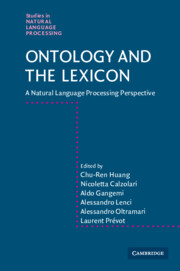Book contents
- Frontmatter
- Contents
- Contributors
- Preface
- Part I Fundamental aspects
- Part II Discovery and representation of conceptual systems
- Part III Interfacing ontologies and lexical resources
- 10 Interfacing ontologies and lexical resources
- 11 Sinica BOW (Bilingual Ontological WordNet): integration of bilingual WordNet and SUMO
- 12 Ontology-based semantic lexicons: mapping between terms and object descriptions
- 13 Merging global and specialized linguistic ontologies
- Part IV Learning and using ontological knowledge
- References
- Index
13 - Merging global and specialized linguistic ontologies
from Part III - Interfacing ontologies and lexical resources
Published online by Cambridge University Press: 06 July 2010
- Frontmatter
- Contents
- Contributors
- Preface
- Part I Fundamental aspects
- Part II Discovery and representation of conceptual systems
- Part III Interfacing ontologies and lexical resources
- 10 Interfacing ontologies and lexical resources
- 11 Sinica BOW (Bilingual Ontological WordNet): integration of bilingual WordNet and SUMO
- 12 Ontology-based semantic lexicons: mapping between terms and object descriptions
- 13 Merging global and specialized linguistic ontologies
- Part IV Learning and using ontological knowledge
- References
- Index
Summary
Introduction
The increasing employment of ontologies to impart a greater level of meaning to the vast and continuously growing amount of data on the web (e.g. in electronic commerce and peer-to-peer systems) is converging, with multiple proposals coming from various communities both to build a Semantic Web that uses ontologies for the annotation of Web resources and to improve NLP applications such as information retrieval and question answering. Rather than contributing to the creation of a set of shared ontologies, however, this has the effect of raising both the degree of heterogeneity and other problems related to interoperability between ontologies. Ontology matching, which mainly consists of enabling two different ontologies to interoperate by finding correspondences between their concepts, has thus become an important topic in research communities across several disciplines.
The problem of ontology matching has been considered in three different dimensions, i.e. in relation to matching two ontologies, two linguistic ontologies (large lexical resources with an ontological structure which is generally semi-formal, such as WordNet), and two linguistic ontologies with different levels of specificity (a global one and one restricted to a particular domain). All three dimensions are relevant for this book, as mentioned in Chapters 1 and 5, especially in the perspective of the combination of ontologies with lexical resources (see Chapter 10 for a thorough discussion on this topic).
As for matching between ontologies, general surveys on recent approaches are provided in Euzenat and Shvaiko, 2007 and Doan and Halevy, 2005.
- Type
- Chapter
- Information
- Ontology and the LexiconA Natural Language Processing Perspective, pp. 224 - 238Publisher: Cambridge University PressPrint publication year: 2010
- 2
- Cited by



